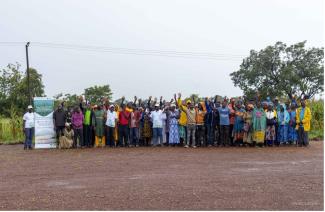
The West Africa Centre for Crop Improvement (WACCI), University of Ghana, in partnership with USAID-AGRA Partnership for Inclusive Transformation in Africa (PIATA), has introduced farmers to a hybrid maize variety, Aburo Legon, aimed at addressing food security challenges and improving livelihoods. Aburo Legon is white-kernel single cross hybrid maize developed by WACCI and released in 2017.
During recent Farmers Field Days held in Nyansa - Sandema, Upper East Region; Wahuba - Funsi, Upper West and in Pavuu - Lawra, Upper West Region more than 300 farmers had the opportunity to learn about the benefits of Aburo Legon. These events form part of the Early Generation Seed (EGS) Phase II project, sponsored by the USAID-AGRA Partnership for Inclusive Transformation in Africa (PIATA), which aims to transform Ghana's seed sector for sustainable food production.

Field Day at Lawra
Prior to the field day, five demonstration trials were established in five communities in the target district where the WACCI team educated farmers on good agronomic practices.

Field Day at Sandema
Farmers who attended the Farmers Field Days were introduced to Aburo Legon and also eductaed on best agronomic practicesto improve their crop yields

Field Day at Funsi
Addressing the farmers, Dr. Pearl Abu, Team Lead of the Maize Breeding Programme at WACCI, gave an overview of the project. She emphasized the importance of adopting good agronomic practices and encouraged the farmers to lead the effort toward achieving food and nutrition security in the country by utilizing improved maize varieties, such as Aburo Legon.

Dr. Pearl Abu, Team lead, Maize breeding programme-WACCI, addressing farmers during the Farmer Field Day
Dr. Abu revealed that Aburo Legon is an early-maturing maize with the potential to yield 9 to 11 tons per hectare. She said that although the variety is not specifically drought-tolerant, it performed well this year in northern Ghana, where there has been limited rainfall. This indicates that it can still thrive in less favorable weather conditions, making it a suitable option for regions with irregular rainfall patterns” she added .
She also took the farmers through agronomic practices such as correct fertilizer application, early pest control, weeds controls among others .
Farmers who participated in the demonstration shared their experiences. Mrs. Evelyn Asugboro, a farmer from Sandema, noted that compared to the maize varieties they had previously grown, Aburo Legon shows the potential for much higher yield. She added that the agronomic practices learned during the event, such as planting in rows, make weed control and fertilizer application much easier, thus improving productivity. "We would be grateful if the seeds are made available during the next planting season," she stated .

Mrs. Evelyn Asugboro
Mr. Stephen Awuniboya Fuseini, a farmer from Funsi, also shared his expreince, stating , "the early maturity of this variety makes it far superior to the varieties we use.”. We are looking forward to getting the seeds for the next season."

Mr. Stephen Awuniboya Fuseini holding the cob of Aburo Legon
Mr. Assibi T. Bawa, an Agriculture Extension Agent in Lawra, commented on the outcomes of the field trials, stating, "The results we have seen from Aburo Legon show that it’s a good variety. Farmers who tried the seeds have testified to its quality. I urge that the seeds be made available to farmers in my community in the upcoming season to boost maize production in Lawra."
Speaking on the side of the event, Dr. Isaac Alvin Amoah, Lecturer University of Ghana, Department of Agriculture Extension revealed that the broader vision of the project is for farmers to adopt the variety to improve their crop yields and, in turn, their livelihoods. "This is what we, as scientists aim to do—to help farmers enhance their lives through improved agricultural practices," he added.

Dr. Isaac Alvin Amoah speaking to the media durring the Farmer Field Day in Funsi
